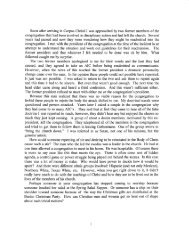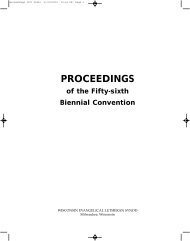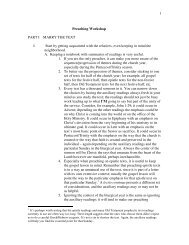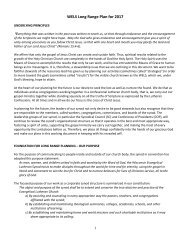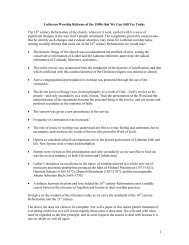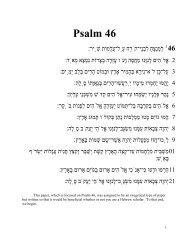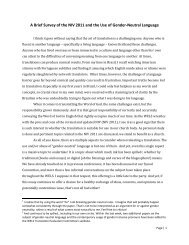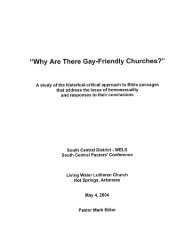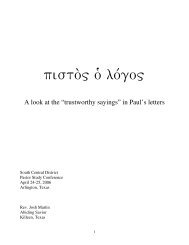A History of the WELS - The South Central District
A History of the WELS - The South Central District
A History of the WELS - The South Central District
You also want an ePaper? Increase the reach of your titles
YUMPU automatically turns print PDFs into web optimized ePapers that Google loves.
5<br />
To bring this diversion to a close, here is <strong>the</strong> “rest <strong>of</strong> <strong>the</strong> story.”<br />
<strong>The</strong> Synod <strong>of</strong> 1867 recommended that each communicant give fifty cents to Synod annually. But this<br />
did not come immediately, in fact, not for quite a few years. <strong>The</strong> years 1869-1870 are considered by some to be<br />
<strong>the</strong> darkest years financially in our Synod’s history. In May, 1870, President Bading wrote in <strong>the</strong> Gemeindeblatt:<br />
<strong>The</strong> College Board will be forced to ask for its dismissal at <strong>the</strong> next synodical meeting and will<br />
hand over <strong>the</strong> keys <strong>of</strong> <strong>the</strong> institution to <strong>the</strong> synod, but in so doing it will declare that we have<br />
perished because <strong>of</strong> <strong>the</strong> heartlessness and indifference <strong>of</strong> our own members. If this is to be <strong>the</strong><br />
end and <strong>the</strong>re is no o<strong>the</strong>r way out, God grant that we may find strength to bear <strong>the</strong> shame and<br />
sorrow. May He chastise us, but not utterly destroy us. 6<br />
Why such strong language? What was <strong>the</strong> real financial situation? By 1870 <strong>the</strong> debt on <strong>the</strong> thirty acres<br />
land purchased for <strong>the</strong> college had been reduced from $6,475 to $4,500, but Mr. Alcott who held <strong>the</strong> mortgage<br />
demanded payment <strong>of</strong> $3,000 at once. <strong>The</strong> College Board instructed Mr. Brumder and George Gamm to try to<br />
borrow $2,000 in Milwaukee and $1,000 in Watertown, but <strong>the</strong>se attempts failed. <strong>The</strong> whole Synod at this time<br />
was burdened with debt <strong>of</strong> $8,500, so <strong>the</strong> college could expect no help <strong>the</strong>re. Synod had to ask Mr. Alcott to<br />
take <strong>the</strong> whole tract <strong>of</strong> land back and cancel <strong>the</strong> mortgage, but he refused and demanded immediate payment.<br />
Finally <strong>the</strong> Synod put <strong>the</strong> pressure on Mr. Gustavus <strong>of</strong> Neenah, to whom $4,000 <strong>of</strong> <strong>the</strong> scholarship funds had<br />
been loaned. <strong>The</strong> board succeeded in receiving full payment for <strong>the</strong> loan. <strong>The</strong> mortgage was paid and<br />
ownership <strong>of</strong> <strong>the</strong> land secured. (In this way it can be said that <strong>the</strong> Scholarship Fund helped pay for <strong>the</strong> 30<br />
acres.)<br />
This land in turn was once again mortgaged to raise much needed money. <strong>The</strong>re was still a debt <strong>of</strong><br />
about $1,500 on <strong>the</strong> land as well as a debt <strong>of</strong> $3,000 on <strong>the</strong> frame dormitory. <strong>The</strong> college simply could not make<br />
ends meet. <strong>The</strong> college reduced <strong>the</strong> steward’s salary to $90 a year with free room, board and laundry. <strong>The</strong><br />
Synod owed Mr. Kusel $2,092.93, a debt that had accumulated through <strong>the</strong> years when he advanced money to<br />
pay for building materials and <strong>the</strong> wages <strong>of</strong> workmen. That amount was reduced by $500 by crediting him with a<br />
perpetual scholarship; he waived any interest on <strong>the</strong> amount; $100 that he had advanced to <strong>the</strong> collector was<br />
taken from him; and finally he cut $92.93 from <strong>the</strong> principal and reduced <strong>the</strong> debt to an even $1,400. Pastor<br />
Sieker pleaded for payment <strong>of</strong> $500 still owed him for his work as collector, but Synod could not pay him. Synod<br />
also withdrew much <strong>of</strong> its financial aid to <strong>the</strong> students <strong>of</strong> <strong>the</strong> seminary. 7 At <strong>the</strong> meeting <strong>of</strong> Synod in 1870 <strong>the</strong><br />
president <strong>of</strong> <strong>the</strong> college laid <strong>the</strong> plight <strong>of</strong> <strong>the</strong> college before <strong>the</strong> delegates. He recommended that Synod close<br />
<strong>the</strong> school now while <strong>the</strong>y could still do it without disgrace. Synod would not accept this.<br />
<strong>The</strong>re was only one way <strong>the</strong> president concluded, to remedy <strong>the</strong> situation, and that was by<br />
regular, orderly support <strong>of</strong> <strong>the</strong> school by <strong>the</strong> congregations. <strong>The</strong> congregations were for <strong>the</strong><br />
most part willing to do something, if only <strong>the</strong> pastors took <strong>the</strong> matter in hand with zeal and<br />
determination. 8<br />
<strong>The</strong> delegates agreed and to show <strong>the</strong>ir determination to keep <strong>the</strong> school alive, <strong>the</strong>y took up a collection <strong>the</strong>n<br />
and <strong>the</strong>re <strong>of</strong> $173. (A good collection at two services for mission support in 1870 was $80.)<br />
<strong>The</strong> 1870’s showed some improvement in <strong>the</strong> financial situation <strong>of</strong> <strong>the</strong> Synod. <strong>The</strong> contributions were<br />
beginning to pick up, but much <strong>of</strong> <strong>the</strong> credit is due to o<strong>the</strong>r sources <strong>of</strong> revenue. <strong>The</strong> land that was purchased for<br />
<strong>the</strong> Northwestern campus became quite valuable when land values rose so rapidly in <strong>the</strong> 1870’s. For example,<br />
When a disastrous fire destroyed one <strong>of</strong> <strong>the</strong> buildings between Christmas and New Year, 1874,<br />
<strong>the</strong> Synod, meeting two months before its usual time in April, 1875 resolved to erect a new<br />
building and to pay for it by selling up to 20 acres <strong>of</strong> <strong>the</strong> college campus. Land values had risen<br />
so rapidly during <strong>the</strong> 1870’s that <strong>the</strong> sale <strong>of</strong> a number <strong>of</strong> lots brought in <strong>the</strong> necessary money. 9<br />
6 Kiessling, op.cit<br />
7 Ibid.<br />
8 Ibid., p. 65.<br />
9 Kiessling, Vol. 37, No. 20, p. 314.



